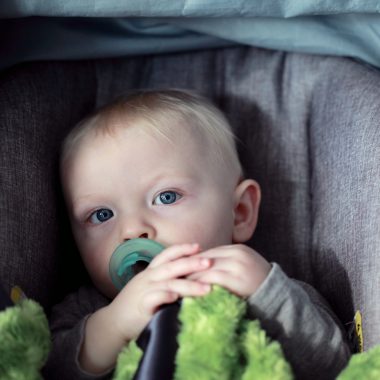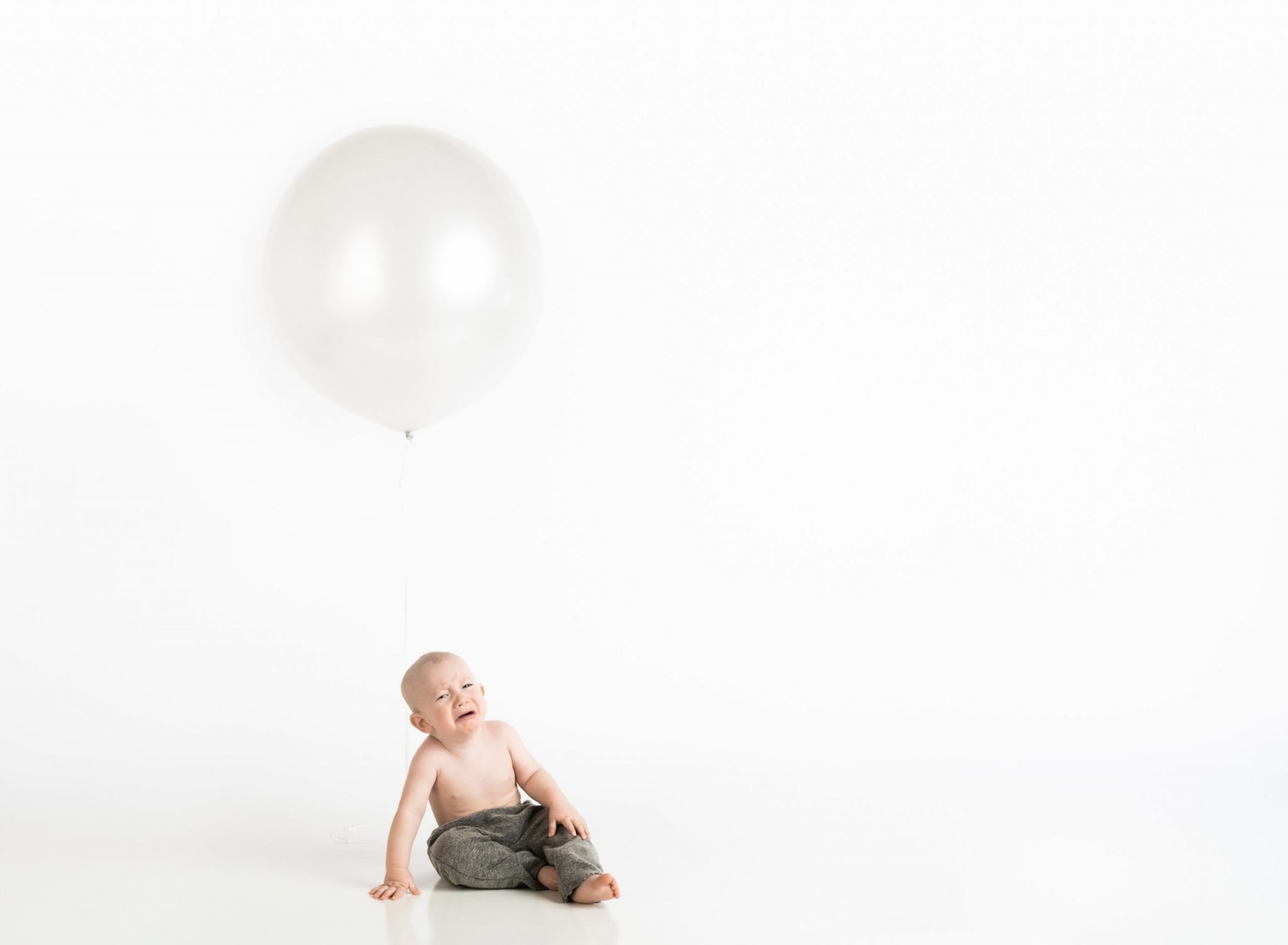Babies are born with the ability to cry.
Crying is the main way for them to tell you what they need or how they feel since their reasoning skills haven’t developed yet, and they quite literally have no other way of expressing themselves.
Babies do have a wide range of emotions, just like adults. But they haven’t learned to process these emotions.
And until they develop the ability to do so, they will resort to the instinctual expression of crying.
They cry for many reasons. Hunger, the need to rest, dirty diapers, and lack of physical contact are some of the many reasons babies cry.
All of these are normal. But we know that sometimes it might be hard for you to understand the reason behind your baby’s tantrums and sometimes it can all get a bit much to bear.
Babies cry a lot in their first 3 months. On average, babies cry and fuss for almost 2 hours a day, and around 1 in 10 babies cry for a lot longer than this.
Crying usually reaches a peak at about 6 weeks of age and then gradually reduces to approximately an hour a day by 12 weeks of age.
In this guide you will find answers to many of your questions about baby crying. As a new parent, knowing the reasons behind your baby’s tears can help you navigate these situations better.
Why do babies cry?
Babies experience a variety of emotions and situations. Below are the most common ones that result in crying:
They are tired or sleepy
Your baby will let you know that they are tired or sleepy in a lot of ways. Some of the obvious ones are jerky movements and the typical droopy eyes.
If you can’t figure out when your baby gets tired, you should start timing their routine. Sticking to a timed schedule will give you a better sense as to when it is time for a nap so you can be prepared.
You can start a nap routine by noting the time around when your baby starts getting fussy and drowsy. The next day, try prepping your baby for a nap around 15 minutes before that specific time.
Sticking to a schedule for naps and sleep with your newborn is very important. It will decrease their levels of fussiness, irritability, and also make it easier for you to look after yourself.
Remember that during the first few months of life, babies cannot differentiate between night and day. That is why is is important to build a routine for them so they can get enough rest.
They need a diaper change
Babies get extremely uncomfortable if their diaper is wet or dirty, and they will express this discomfort by crying.
If your baby has been crying a lot because of a dirty diaper, then you are probably not changing them frequently enough. Did you know that babies go through approximately 2,500 diaper changes during their first year of life?
A simple way to avoid crying due to dirty diapers is to change them regularly. Another reason why you should be quick to change your baby’s diaper as soon as it gets dirty is to avoid possible rashes.
If your baby develops a rash, they will be in far more discomfort and cry much more. Experiment with different diaper brands and types until you can find one that works best for you and your baby.
They are hungry
A hungry baby can quickly become an angry baby, which means you will have a screaming infant on your hands in no time.
To avoid reaching this stage, you should have a feeding schedule prepared for your baby. This will ensure that your baby never gets overly hungry.
Once there is a routine in place, your baby will quickly adapt and follow a routine, meaning they will wait to be fed.
Babies also give lots of hunger cues, such as latching on your fingers, wriggling around, making some distinct sounds. They might even try to eat their hands.
If you notice your baby doing any of these things, take it as a cue to feed them.
They are overstimulated
If your baby cries when they are in the car, in a store or at a restaurant, chances are they’re overstimulated. Overstimulation is very common amongst infants, because they are not used to all the various stimuli they are being exposed to.
This doesn’t mean that you have to shut your baby off from all environments. Your baby will gradually get used to their surroundings once they acclimatize to various types of stimuli.
There are some ways to decrease chances of overstimulation. One such example is by covering your baby’s stroller with a dark blanket when you go out for a walk.
You should also make sure that your baby is well rested and well fed before you head out. Taking your infant’s journey to the outside world step by step will go a long way in easing them into the world
They have colic
Colic is often misunderstood. Colic doesn’t stem from stomach issues or diseases. Instead, it’s a term used to describe excessive, unexplained crying in otherwise healthy babies.
Dealing with colic can be challenging, and there isn’t a single, foolproof solution. However, the good news is that it’s a phase that will eventually pass.
Parents can try various soothing techniques. Some find that gently bouncing on a yoga ball helps calm their baby. Another method that has proven effective is holding the baby face down across your arm and walking around. These techniques can offer some relief during colicky episodes.
We will discuss colic in further detail in this comprehensive guide about why babies cry.
They have acid reflux or gas
Gas can cause discomfort for babies, often leading to prolonged bouts of inconsolable crying.
You’ll recognize gas issues in your baby if they frequently pass gas or attempt to do so. Gassy newborns may also experience crying and hiccups following feedings.
If you find that your baby frequently suffers from gas, you can explore laid-back breastfeeding positions, which can reduce the intake of excess air. Additionally, taking more burp breaks during breastfeeding can be helpful.
Some parents have had success by experimenting with different bottle brands.
If you suspect your infant has acid reflux, it’s essential to consult with a pediatrician. They can provide a proper diagnosis and, if needed, prescribe appropriate medications.
They have teething pains
Teething can be a challenging phase for babies, often causing them discomfort that leads to nighttime crying.
In some cases, teething can even increase the risk of ear infections, adding to your baby’s distress. If your baby experiences prolonged, uncontrollable crying, consider visiting your pediatrician for an evaluation.
To alleviate teething pain, you can offer teething toys or provide relief with frozen washcloths. Additionally, you can try various distractions like going for a walk, using white noise, or gently bouncing on a yoga ball with your baby, which may help soothe their discomfort.
They have stranger anxiety or fear
If your baby becomes upset when unfamiliar people attempt to hold them, it’s a typical response known as stranger anxiety.
Stranger anxiety is a common developmental phase and typically not a cause for concern. Babies usually outgrow it.
To help your baby feel more at ease, it’s a good practice to allow them to approach new people at their own pace, rather than forcing interactions. Remember, it’s a normal phase, and there’s no need for parents to provide explanations or justifications to others.
What are some signs of stress in babies and how to handle them?
Stress in babies can be triggered by environmental factors or ongoing health issues like gas or reflux, hindering their ability to relax.
Crying is a natural response in babies, making it challenging to recognize stress. Here are common signs that your baby might be stressed:
- Refusal to eat or feed.
- Excessive crying.
- Reduced emotional responsiveness, appearing unresponsive.
Sources of stress in babies
There are numerous reasons why your baby may get stressed. To learn more about some of the common ones, you have:
Prenatal stress in babies
According to the University of Zurich , if an expecting mother has been stressed over a very long period of time, it can increase the risk of the baby developing a mental illness later on in life.
However, short term stress has no effect on the baby in the womb. It is very normal to feel stressed out, and pregnancy is no easy feat.
So as a mom, you don’t have to worry about harming your unborn babies every time you experience some kind of stress. However, if you feel like your stress levels are above average, consult your doctor.
Baby’s needs are unmet
Newborns and infants have basic needs. These are nourishment, affection and attention.
If these basic needs are unmet, it can result in toxic stress for the baby which will also continue to affect them as they grow older.
Unmet needs will prevent your child from reaching their full potential.
Frustration during development
At a certain point of the developmental process, be it 3 months, 6 months or even a year, babies tend to get incredibly fussy.
For babies it can get quite overwhelming when things are changing constantly for them, which in turn can be stressful.
Try to look at it from their perspective! When the world is noisy and fuzzy and you don’t have much control over anything, you pretty much feel the same.
Crying from stress is quite an understandable and normal response. You can look into ways of reducing sources of stress for your baby.
Experiencing physical pain
A baby’s body is continually evolving, and some of these changes can be initially uncomfortable, such as teething. Their digestive systems are also adapting, and there may be some temporary hiccups along the way.
These are short-term stressors for the baby, and they will soon subside. As a parent, comforting your baby with cuddles and soothing techniques can help ease their discomfort.
If you suspect the pain is due to an unidentified issue, consider scheduling an appointment with a pediatrician.
Yelling, arguing or fighting
Continuous loud arguments and shouting at home can be distressing for a baby, potentially causing stress. A disturbing home environment can take a huge toll on your little one.
Babies are already navigating significant changes as they grow, and external environmental disturbances can heighten their stress levels.
Growing up in a household filled with negativity may have long-term adverse effects on your baby.
Can newborns cry for no reason?
Sometimes it can feel like your little one is crying for no reason at all. However, that is not true.
It’s not always easy to pinpoint the reason for why a newborn is crying. They may be well fed, burped, in a clean diaper, and still be bawling their eyes out.
Babies are learning new things about themselves and their surroundings every second, and that process gets overwhelming for them. It may seem like all is well, but for your baby to cry there must be something that is bothering them.
Newborns and infants only have two modes during the early stages of their life: sleeping and crying. The only outlet for them to express themselves at that age is to scream and cry their feelings out!
If you feel like your baby is crying for no reason, think again, and go through this list:
- The baby is still hungry. It may seem like they’re full, but try offering them feed and see if they take it.
- Baby is over-tired, and may not want to sleep on their own. Try holding and rocking them, and they might doze off.
- They may be overstimulated, and you might not have realized it. Try wearing your baby with a baby wrap. Parents have experienced that it makes for a relaxed and content baby.
- They may just be plain bored! Yes, babies get bored too, just like we do. Try putting on some music and see if that entertains them.
- A gas bubble is bothering them. Gas can be very painful for infants, which could explain the persistent crying. If you have already burped them, try using some gas drops.
After going through the checklist, if you feel like your baby is perfectly fine and healthy, then the last thing for you to do is wait it out.
We promise, things do get easier with time as both you and your little one figure things out!
Decoding different types of baby cries
A newborn’s cries will all sound the same in the beginning. But as the baby gets older, you will notice slight differences in the way they cry.
Each baby develops their unique “vocabulary” of cries over time, including variations in pitch, tempo, and intensity.
Notably, bestselling author and pediatrician Dr. Karp suggests that distinguishing between cries in the first 3 months can be quite challenging. However, after 3 months, you’ll become more attuned to your baby’s personality, and these differences in crying will become clearer.
Baby crying sounds – Dunstan Baby Language
According to Dunstan baby language, there are some universal sounds that babies make. Below are those 5 sounds:
“Neh”
The “neh” sound means that the baby is hungry.
“Eh”
The “eh” sound means that the baby needs to be burped.
“Eairh” or “Earggghh”
This sound means that the baby needs to poop or has gas.
“Heh”
This sound indicates physical discomfort e.g. being too hot, cold or wet.
“Owh”
The “owh” sounds means that they are sleepy.
The Dunstan baby language method has worked for a lot of parents. But every baby is different, and it is not an issue if you can’t decipher these sounds with your baby.
Your baby might have their own way of telling you what they want which is different from the Dunstan baby language, and it is perfectly okay.
Here are some other ways that can help you make some sense of your baby’s crying:
- Hungry crying will involve your baby moving their lips and looking for a breast or bottle. Try brushing your finger on their cheek and if they follow it to latch then that means they’re hungry.
- A shrill scream will mean that the baby is in some sort of pain. This could be gas or acid reflux.
- If they are crying while rubbing eyes, then that means they are overtired and its way past their bedtime.
- If they immediately cry after a loud noise, then that means they are startled and scared.
How long can a newborn cry for?
Newborns can cry for extended periods, often up to 2 hours or even longer, indicating a colicky baby.
Despite your best efforts to console and soothe your baby, their crying may persist, leaving you with little to do but wait it out.
Ensure your baby’s safety, and watch for any cues that might help calm them down, such as offering a feed or changing their diaper.
Does your baby wake up crying hysterically at night?
Something that parents have experienced a lot with their infants, typically babies that are between 2-5 months old, is that the baby wakes up crying hysterically after they have put down to sleep for the night.
The crying can be quite loud and shrill, and frustrating for parents because it’s sudden and there doesn’t seem to be a logical explanation for all the crying.
If you have experienced something similar, here are a few possible reasons behind this:
4 month sleep regression period
This sounds intense, but the 4 month sleep regression is a phenomenon that marks a permanent change in your baby’s sleep cycle.
In simple words, this means that your baby’s brain has matured, and their sleeping patterns have become more adult-like.
Before, your baby used to sleep deeply. However, after reaching 4 months, they’ll begin cycling between light and deep sleep stages.
During this adjustment period, they may wake up in the middle of the night or during naps, crying inconsolably.
Rest assured that as long as you maintain a consistent schedule, this phase will gradually pass.
Teething pains
You can check your baby’s gums for any emerging teeth. Teething can begin as early as 4 months, and it can be a painful process for your little one.
The most helpful steps you can take are offering teething toys or gently rubbing something cold on your baby’s gums to provide relief and help them settle back to sleep.
Overtired or overstimulated
If your baby consistently wakes up crying at the same time each night, it may indicate that they are overtired by bedtime and struggling to enter deep sleep.
To address this, consider adjusting their sleep schedule by putting them to bed a bit earlier. Additionally, preparing their feed in advance can help soothe them back to sleep more swiftly when they wake crying.
Purple crying
Purple crying isn’t about your baby turning purple from crying. It’s a term used to describe a period of increased and often inconsolable crying in infants that lasts for hours with no apparent reason.
This phase typically occurs between 2 weeks and 4 months of age. It can be understandably frustrating for parents, but remember, it’s a temporary phase.
HELP! My baby won’t stop crying at night
Between 4 weeks and 7 months of age, you may encounter a phase where your baby cries persistently, especially during nighttime, even when it appears there’s no obvious reason for their distress. This behavior, although disconcerting, is completely normal.
During this period, your baby is going through rapid physical and mental growth. As the book “The Wonder Weeks” explains, “Your child enters new worlds eight times, where they can perceive things they couldn’t before.”
This significant developmental leap can be overwhelming for your baby, leading to extended bouts of inconsolable crying. Various factors, from gas discomfort to colic, can contribute to their distress.
Here are some things that you can do to comfort your crying baby:
- Wrap your baby in a snug swaddle. Babies find comfort in swaddle wraps, and being held close can help soothe them.
- If your baby seems gassy, try laying them on their left side, as it aids in digestion and alleviating gas discomfort.
- Ensure the room temperature is just right. Avoid over-bundling your baby; instead, adjust the room temperature to a comfortable level for both you and your little one.
- Check for any disruptive sources of light in the room that might disturb your baby’s sleep.
- If you’re bottle-feeding, consider using bottles designed to reduce colic symptoms.
- Breastfeeding? Try eliminating dairy from your diet, as some babies are intolerant to dairy products.
- Discuss probiotics with your pediatrician. Infant digestive issues are common, and probiotics can help ease these discomforts.
- Consult your pediatrician for a potential reflux diagnosis. Reflux can occur in babies without noticeable spitting up, and your doctor may recommend appropriate treatments.
- Experiment with white noise. Before purchasing a white noise machine, try using white noise sounds on your phone to see if they help your baby sleep. Many parents have found this to be effective.
- Give your baby a gentle massage. Massages can be relaxing for babies, and they may help prevent gas bubbles.
- If you feel like you’ve tried everything and are becoming overwhelmed, don’t hesitate to take a break. Caring for a continuously crying baby can be extremely stressful, and it’s essential to prioritize your mental well-being to provide the best care for your infant.
Should I be concerned that my baby cries at bedtime?
There is no cause or reason for concern if your baby cries at bedtime. It is normal for infants to do so.
Crying is something babies will be doing a whole lot, because it’s their primary response and reaction to everything they go through.
Here are some pointers to better understand your baby’s cries at bedtime:
- Ensure your baby is well-fed before bedtime. Babies go through rapid growth, and providing them with sufficient nutrition is essential to support their development.
- If your baby appears overtired and cries at bedtime, consider adjusting their sleep schedule to an earlier bedtime.
- Your baby might be experiencing separation anxiety, and they may prefer not to be away from you. Spend some time with them in their nursery until they fall asleep to ease this anxiety.
- At around 4 months of age, your baby could be going through the 4-month sleep regression. During this phase, their sleep cycles change, and they transition between light and deep sleep. It may take some time for them to adjust to this new pattern.
If your baby cries every time before sleep, be it during a nap or at night, several factors might be contributing to this. For one, your baby may not yet recognize their own sleepiness and could express it through fussiness and crying. In such cases, adjusting their sleep routine might be necessary to ensure they’re well-rested.
For co-sleeping families, the presence of people in the room can sometimes overstimulate the baby during bedtime. To address this, consider putting your baby to bed and then stepping out of the room. They might cry briefly but often settle down and fall asleep.
It’s possible that you’re offering more assistance than your baby needs to fall asleep. Experiment with giving them some space to self-soothe and learn to settle on their own. Sometimes, a bit of fussing allows babies to release pent-up energy, making it easier for them to drift into slumber.
How can I stop my baby from fighting sleep?
classic “it’s nap time” signal.
But as you lay them down in their usual sleep spot, just as they’re about to drift into a peaceful slumber…
They suddenly wake up, screaming and crying.
As strange as it may sound, babies are known to resist sleep even when they’re tired.
There isn’t a definitive scientific explanation for this behavior. However, some research suggests that babies might do this because they’re too exhausted to fall asleep, leading to frustration.
The most important step to help your baby stop resisting sleep is to put them to bed earlier. You want to prevent your baby from becoming overly tired.
Swaddling can also be beneficial as it prevents their arms and legs from jerking, which might be one of the reasons they wake up crying shortly after falling asleep.
Is it possible to stop my baby crying at night?
It’s completely normal for newborns to cry at night.
Your baby has spent the last nine months in your womb and is just beginning to adjust to the outside world. That’s why they want to be as close to their mom as possible. After all, it’s all that they’re used to.
Holding them close in a baby wrap sling while you rock and bounce them can help soothe them to sleep. Consider warm swaddling too, using snug blankets, as babies can get chilly without you noticing, and staying warm helps them sleep better.
If your baby is breastfeeding, there’s a chance they might not be getting enough milk. Consult your pediatrician about the possibility of supplementing with formula to ensure they’re receiving adequate nourishment.
The first 2-3 weeks can be the most challenging when dealing with a crying newborn, so it’s crucial for you and your partner to collaborate and take turns to help soothe the baby to sleep.
Is it okay to bounce my baby to sleep?
You can absolutely bounce your baby to sleep without worry.
If you’re concerned about bouncing too hard, you can rest assured that you’re not. Serious head trauma typically results from much more force, like the rapid shaking associated with shaken baby syndrome, which causes the baby’s head to move forcefully back and forth.
As long as you ensure that your baby’s entire body is moving and you’re using gentle, controlled movements, your baby is safe.
For added comfort, you can invest in a yoga ball to bounce on while safely holding your baby.
Many babies find the bouncing motion soothing, and it can also help relieve any built-up gas pressure, making it a very natural and effective way to put your baby to sleep.
If you’re still concerned about your bouncing technique, consider demonstrating it to your baby’s pediatrician for reassurance.
Should I ignore my baby crying at night?
Whether or not to ignore your baby’s nighttime crying depends on two key factors.
Firstly, you should identify the cause of your baby’s crying. It could be due to a dirty diaper, hunger, or gas. If any of these needs are the source of discomfort, it’s important to attend to them promptly.
Secondly, consider your baby’s age. For infants up to about 5 to 6 months, it’s generally advisable not to ignore nighttime crying. Babies of this age often don’t possess the self-soothing skills needed to put themselves back to sleep. Thus, they rely on you to help them return to slumber.
Some parents who are contemplating sleep training may wonder, “Should I ignore my baby’s crying at night so they learn to self-soothe?” Listening to your baby cry without intervening can be challenging. However, there are gentler methods, like the Ferber method, that combine sleep training with periodic check-ins.
ALSO READ: How To Sleep Train My Baby With Invidyo
According to the Ferber method, when your baby cries after bedtime, you can check on them at intervals of 3, 5, and 10 minutes, gradually increasing these intervals on subsequent nights (e.g., 5, 10, 12 minutes on the second night). This approach may assist your baby in sleeping through the night.
If you’re concerned about your baby not needing to eat at night, let us reassure you with the fact that a healthy 6-month-old baby typically doesn’t require nighttime feedings.
Is it okay to let my baby cry to sleep?
It’s not advisable to allow a newborn, especially one just a few weeks old, to cry themselves to sleep. Infants of this age haven’t yet developed the ability to self-soothe, and crying is their primary means of communicating discomfort or needs.
Generally, newborns this young cry for reasons that are relatively easy to address, such as a soiled diaper, hunger, improper burping, being too hot or cold, or reflux. If your baby’s crying is persistent and occurs every night, particularly if reflux is suspected, it’s a good idea to consult a pediatrician for evaluation and guidance.
However, as your baby grows and reaches around 6 months of age, it becomes more acceptable to consider letting them learn to self-soothe and fall asleep on their own, provided that you use a method with periodic checks. This gradual approach can help them develop independent sleep habits.
Should I pick my baby up every time they cry?
For babies under the age of 5 months, providing comfort when they cry is essential. If they find solace in being held by you, then you should indeed do so. Babies of this age haven’t yet learned self-soothing, and they rely on you for comfort and security.
If you’re concerned about tiring from holding your baby, consider using a baby sling or carrier. This way, you can keep your baby close while also freeing up your arms.
Remember, picking up your crying baby at this age is not creating a “bad habit.” Your baby depends on you for a sense of safety and reassurance during this crucial early stage of development. The period of increased fussiness typically peaks around 6 to 8 weeks but should gradually subside, and your baby won’t require as much holding or soothing as they get older.
How long do baby crying episodes last?
There is no right answer to this question. Babies’ crying durations can vary widely, ranging from as short as 5 minutes to over 3 hours. This duration primarily depends on their developmental stage.
Your initial task is to ensure they are comfortable by checking for common issues like hunger, wet diapers, gas, or reflux. For parents dealing with colicky babies, it may take a few weeks for them to outgrow this phase.
If you’re engaged in sleep training and wondering how long your baby might cry before they fall asleep, it’s possible they could cry for more than 2-3 hours before self-settling.
When practicing sleep training, it’s important to gradually extend the intervals between your periodic checks. If you check on them every 5 minutes, for instance, they’ll come to expect your presence.
Sleep training can be challenging in the initial 2-3 days, but it typically becomes easier as you persist.
ALSO READ: Is It Okay To Let My Baby Cry It Out?
When should I start sleep training?
The recommended age to start sleep training your baby is typically around 6 months of age.
Nevertheless, it’s crucial to recognize that every baby is unique, and some parents have observed positive outcomes from sleep training as early as 4 months.
As a parent, you are in the best position to gauge your baby’s needs and readiness. If your baby is healthy, has established a reasonable nap routine, and is around 4 months old, sleep training might be suitable for your family.
Why does my baby wake up crying?
If your baby has been waking up crying, several factors could be contributing to this:
- Temperature Discomfort: If your baby is under 2 months old, they may wake up crying due to discomfort related to the room temperature. Make sure your baby is dressed appropriately, neither too hot nor too cold, to ensure a comfortable sleep environment.
- 4-Month Sleep Regression: Babies around 4 months old often experience sleep regression. During this period, their sleep patterns change as they transition between deep and light sleep. Your baby may wake up crying during these transitions. They might not be accustomed to these shifts yet.
- Teething: Teething, which typically begins around 4-5 months, can cause pain and discomfort, leading to nighttime waking and crying. Consult your pediatrician for advice on managing teething-related discomfort.
- Overtiredness: Sometimes, babies wake up crying because they are overtired. Being excessively tired can make them uncomfortable and disrupt their sleep. If you suspect overtiredness, consider adjusting your baby’s bedtime to help them sleep more comfortably.
Addressing these potential causes can help your baby have a more restful night’s sleep.
Tips for calming your baby down
It’s entirely normal for babies to cry excessively, even when they are perfectly healthy. This crying can be challenging to calm because the cause of their discomfort isn’t always clear.
If you’re a first-time parent, it’s understandable that this situation can test your patience. It’s crucial to remember that caring for a constantly crying baby can take a toll on your mental health, so it’s important to take care of yourself.
Here are a few strategies to help you stay calm when soothing your baby, while also ensuring there are no underlying health issues:
- If your baby has been crying for a while and you feel your temper rising, it’s okay to place your baby in a safe location and take a few minutes to regain your composure. Remember that you’ll be better equipped to calm your baby when you’re in the right frame of mind.
- Share the responsibility with your partner to ensure both of you get some rest. Taking turns can significantly help in managing the challenges of a constantly crying baby.
- Keep in mind that it does get better, and this phase is temporary. Your baby is adapting to a new environment, and crying is their way of coping with it.
“The Hold” technique by Dr. Robert Hamilton
A technique by Dr. Robert Hamilton can potentially stop a baby from crying in a matter of seconds. This technique is called “The Hold” and you can watch this video to see how he does it. Broken down, the video shows the following steps to to calm a crying baby in a few seconds:
- Gently hold the crying baby and flip them so that their belly and face are facing the floor.
- As you turn your baby, you should fold their little arms, so they are not flailing around.
- Next, you have to ensure that the baby’s neck is resting on the cradle between your thumb and forefinger.
- Your dominant hand should be cradling their bottom.
You can try different variations of this technique, and it has proven to be successful by many parents.
It might not be helpful all the time, but it is definitely worth a try.
“The 5 S’s” by Dr. Karp
Another popular technique amongst parents is Dr. Karp’s 5 S’s. These are 5 ways you can respond to a crying infant.
Swaddle
Swaddling can be incredibly comforting for babies as it provides them with a snug and secure feeling. If you’ve attempted swaddling and it seems like your baby doesn’t initially like it, don’t give up right away.
You can try a few things to help your baby get accustomed to swaddling. While they’re swaddled, try nursing them, gently bouncing them, or rocking them. With some patience and persistence, your baby might just come to enjoy the comfort of swaddling.
Side or Stomach
Another technique you can explore is holding your baby on their stomach or their side. This position is often effective in soothing babies and can help relieve any discomfort caused by gas.
Shush
It might surprise you to learn that the womb isn’t a completely silent place. There are subtle sounds, like the flow of blood and the gentle hum of the mother’s body, that keep a baby comforted in the womb.
To replicate these soothing sounds, you can use a white noise machine or a white noise app. Alternatively, you can gently whisper “shhh” in your baby’s ear to create a calming auditory environment.
Swing
Consider trying gentle swinging or rocking motions to soothe your baby. Many parents have discovered that bouncing on a yoga ball can be particularly effective.
Suck
Babies often find comfort in sucking, so offering them a pacifier might help calm them down.
What to do if nothing helps with baby’s crying?
If you’ve exhausted various soothing methods and your baby continues to cry persistently, consult your pediatrician for the possibility of acid reflux. Acid reflux is a common issue among babies and can’t be self-diagnosed by parents.
Fortunately, it’s usually treatable with prescription medication and can significant reduce incessant crying.
You should also consider potentially eliminating dairy and soy products from your diet if you’re breastfeeding. However, it’s essential to do this under the guidance of your baby’s pediatrician. Some infants have milk-soy protein intolerance, which can lead to excessive crying.
For formula-fed babies, if the crying persists, consult your pediatrician about potentially changing their formula.
Ultimately, if your baby is experiencing constant crying, it’s crucial to seek advice and guidance from a pediatrician to ensure your baby’s health and well-being.
What helps a crying baby?
Here are some helpful tips that might provide comfort to a crying baby. Keep in mind that what works can vary from one baby to another:
- If you’re breastfeeding, allow your baby to suckle at your breast.
- Background noise can be soothing and distracting for your baby.
- Some older babies find comfort in a piece of cloth or a small blanket.
- Hold your baby or use a sling to keep them close. Gently move around, sway, dance, talk, and sing.
- Rock your baby back and forth in a pram, or take them for a walk or a drive. Limit time spent in a car seat to 30 minutes for newborns and up to 2 hours for older babies.
- Try stroking your baby’s back with a firm, rhythmic motion. Hold them close or lay them face down on your lap.
- Undress your baby and give them a gentle, warm massage. Avoid using oils or lotions until your baby is at least a month old. Maintain a soothing conversation and ensure the room is comfortably warm.
- A warm bath can have an instant calming effect on some babies.
- Sometimes, excessive rocking and singing can keep your baby awake. Laying them down after a feed might help.
- If the crying persists, consider seeking advice from your health visitor.
- If you suspect reflux, consult your healthcare provider for a checkup.
HELP, I feel triggered by my baby’s crying
If you find yourself feeling guilty when your baby’s cry triggers a fight or flight response, remember that this is a normal reaction. It can be overwhelming and exhausting to care for a fussy baby. Parenting is a tough job, we know.
The simple answer is: you need a break. After ensuring that all of your baby’s immediate needs are met, including a full tummy, a clean diaper, and burping, take a short break and step away from your baby for a few minutes. Hearing your baby cry without knowing how to soothe them can be incredibly distressing.
Maintaining your mental well-being is vital, so you can better attend to your baby’s needs. These strategies can help you stay calm:
- Imagine putting in imaginary earplugs, allowing the sound of crying to pass through you, while reminding yourself that everything is okay.
- Don’t hesitate to ask another person for help. If possible, involve your partner, a friend, or a relative to take over for a while.
Remember, taking care of yourself is essential for effectively caring for your baby.
Why is my baby crying while breastfeeding?
If your baby is pulling off your breast, crying and fussing, despite still being hungry, here are some of the reasons as to why they are doing that:
- Burping: Babies should be burped during the feed to release any trapped gas that might be causing discomfort. If your baby cries often while breastfeeding, try burping them multiple times during each feed.
- Reflux: Acid reflux can hinder your baby from eating to their full capacity. Consult a pediatrician if you suspect reflux might be the issue, as it can cause feeding problems.
- Overactive Let-Down: If you experience an overactive let-down, it might cause your baby to choke during feeds. To address this, you can catch some of the milk spray with a cloth before feeding your baby.
- Nasal Congestion: Blocked nasal passages due to mucus can lead to breathing difficulties. If you think this is a problem, consider clearing your baby’s nose before feeding.
- Low Milk Supply: If your milk supply is insufficient, it may leave your baby unsatisfied and upset. Consult your doctor to explore options for feeding your baby.
- Dietary Intolerances: Your baby could be intolerant to dairy or soy products present in your milk. Before removing these items from your diet, consult your doctor for guidance.
It’s essential to address these issues to ensure a more comfortable feeding experience for your baby.
Why is my baby crying while bottle feeding?
If your baby cries during bottle feeding, several factors may be causing their distress. Here are some possible reasons:
- Milk Flow: The milk may be flowing too quickly from the bottle, causing your baby to struggle. You can try using slower flow nipples to regulate the milk flow.
- Formula Sensitivity: The formula you’re using might not agree with your baby. It’s advisable to consult your pediatrician about potentially switching to a different formula that is gentler on their stomach.
- Reflux: Your baby could be experiencing reflux, which can cause discomfort during feeding. Your pediatrician can recommend reflux medications or suggest an anti-reflux formula to ease this issue.
- Ear Infection: Ear pain, often related to teething, can cause discomfort during feeding. Consult your pediatrician to rule out ear infections.
- Gas: Gas can be a common issue for infants. Ensure you burp your baby more frequently during the feeding process, not just afterward, to release trapped gas.
By addressing these factors, you can create a more comfortable and enjoyable feeding experience for your baby.
My baby stops breathing while crying
It’s not uncommon for babies to briefly pause their breathing while crying. When a baby cries intensely, they may exhale and then hesitate before inhaling. This pause usually lasts for a few seconds. While it can be concerning for parents to witness their baby stop breathing, it’s important to note that babies can typically hold their breath for up to about 15 seconds.
If your baby’s breathing pauses are very frequent or unusually long, it’s advisable to consult a doctor promptly to rule out any underlying issues or concerns. In most cases, these brief breathing pauses during crying are a normal part of infant behavior.
My baby doesn’t know how to cry
It’s important to note that not all babies express their distress by crying. Some babies might coo loudly or make fussing noises when they are upset instead of having a full-blown crying bout. This variation in how babies communicate their discomfort is perfectly normal.
If your baby is not crying as frequently when they are upset, it doesn’t necessarily indicate a problem. Babies have their unique ways of expressing themselves.
However, if you have concerns, it’s always a good idea to discuss them with your baby’s pediatrician to ensure that your baby is developing and growing as expected. In most cases, this difference in crying behavior is not a cause for concern.
My baby is trembling while crying
It’s not uncommon for babies and infants to experience jitters or trembling while crying. This trembling can also occur when babies are nursing.
These tremors are typically due to the fact that very young babies have limited control over their limbs, and crying can sometimes trigger these trembling movements.
In most cases, if the trembling episodes are brief (lasting less than 15-20 seconds) and infrequent, there’s usually no need for concern. Babies tend to outgrow this behavior as they get older.
If you notice that your baby frequently experiences trembling while crying, it’s advisable to consult their pediatrician for a thorough evaluation.
Does crying too much cause damage?
Babies are known to cry relentlessly and unconsolably for days. This is simply how they communicate, and cope with how they feel.
Infants and newborns need to be consoled when they cry, because they haven’t learned how to self soothe yet.
To answer the question, crying too much is not bad for the baby but not consoling the baby when they are crying can be bad for them in the long run.
According to a study, babies that are neglected while crying produce high levels of a stress hormone called cortisol.
How to identify baby crying from gas pains?
You’ll recognize that your baby has gas pains through the following signs:
- They cry after being fed. Sometimes, they may fall asleep after feeding but wake up crying.
- They attempt to pass gas, noticeable as their face turns red and they clench their fists.
- They may moan and kick their legs due to the discomfort caused by gas.
If your baby frequently passes gas, it could be a sign that excess air is entering their system during feedings.
In the first couple of weeks after birth, babies often experience digestive issues because their digestive system is still developing. If your baby is very young and has gas problems, they will likely outgrow them.
For older babies with persistent gas issues, it’s advisable to consult a doctor. Gas drops and prescribed medications can help alleviate their discomfort.
How can I relieve baby’s gas?
Gas problems are a common source of discomfort for babies, and there’s no simple fix that works for every baby. But, here are some methods that have proven helpful for many parents:
- Gently move your baby’s legs in a bicycle pedaling motion, then bring both knees toward their chest to help them pass gas.
- Place your baby face down across your lap and pat their back until they pass gas.
- If you’re breastfeeding, consider eliminating gassy foods like dairy, beans, and broccoli from your diet.
- Pause feeding midway to burp your baby, then resume.
- A warm bath can provide relief for your baby.
- Position your baby on their tummy, either on your chest or lap, as the gentle pressure can assist in passing gas.
- If you experience a strong letdown, try not to latch your baby on immediately; instead, hand express some milk to relieve the pressure.
How can I make my baby happy?
In the early months, it’s common for babies to seem a bit grumpy. This doesn’t mean they’re unhappy, but rather, they’re eager to be more active while their bodies are still adjusting.
The good news is that babies are easily entertained and delighted. Every little thing is a new adventure for them, from their tiny toes to your smile.
Try gently moving their arms and legs or playing peek-a-boo. Knock over some lightweight objects and observe their reactions. You might even get a giggle or two.
If your baby isn’t smiling or laughing frequently, there’s no need to worry. Keep introducing new experiences, and they’ll gradually start responding.
What tests should my baby get?
During the initial days of your newborn’s life, they will undergo several screenings to ensure their health and well-being. These tests include:
- Apgar Score Assessment: This is a comprehensive evaluation of your baby’s health conducted immediately after birth.
- Heart Disease Screening: This screening checks for any potential heart defects or abnormalities.
- Blood Screening: This test is performed to detect any genetic, hormonal, or functional issues in your baby.
- Hearing Test: A hearing evaluation is conducted to assess your baby’s hearing abilities.
If you think you might have a colicky baby on your hands, you may find this article about Causes, Symptoms, Prevention and Treatment of Colic helpful.
References: webmd.com, happiestbaby.com, calmingcolic.com, sciencedirect.com, kidshealth.org, medicalnewstoday.com, askdrsears.com, whattoexpect.com, dodcoaching.com, purplecrying.info, babysleepsite.com, mayoclinic.org, healthline.com, psychologytoday.com










